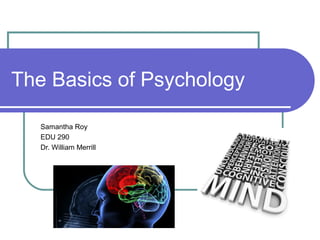
The Basics of Psychology
- 1. The Basics of Psychology Samantha Roy EDU 290 Dr. William Merrill
- 2. The History and Scope of Psychology Psychology’s Roots- Philosophy Biology Philosophy’s questions and biology’s methods = psychology Image from: Exploring Psychology in Modules by David. G Myers http://www.nctc.edu/Libraries/Home_Page/Psych_head.sflb.ashx
- 3. Psychology’s Birth – 1879 Wilhelm Wundt- created the first psychology lab University of Leipzig (Germany) Father of Experimental Psychology Founder of Modern Psychology Psychology- the scientific study of behavior and mental processes Behavior- anything an organism does that is an observable or recordable action Mental Processes- internal subjective (debatable) experiences inferred from behavior Exploring Psychology in Modules by David. G Myers
- 4. Philosophers John Locke (1632-1704) at birth the mind is a blank slate empiricism- rely on observation and experimentation William James 1st psychology textbook Exploring Psychology in Modules by David. G Myers Image from: http://assetebooks.com/resources/The%20Principles%20of %20Psychology.JPG
- 5. Biology - Pavlov (Russian Physiologist) discovered the learning principles classical conditioning unconditioned stimulus (US) conditioned stimulus (CS) unconditioned reflex (UR) conditioned reflex (CR) came up with the dog experiment Exploring Psychology in Modules by David. G Myers Image from: http://www.nobelprize.org/educational/medicine/pavlov/images/serie2.
- 6. Biology- Freud (Austrian Physician) Personality Theorist three different components Id all of the biological components of personality immediate satisfaction Ego the mediator between the id and the superego Superego uses morals to do what is right Image and information: http://www.simplypsychology.org/psyche.html
- 7. Biology - Piaget (Swiss Biologist) Developmental Psychology Cognitive Theory Sensorimotor stage (birth to 2 years) Key component – Object permanence Pre-operational stage (2 to 7 years) Key component – egocentrism Operation stage (7 to 11 years) Key component - conservation Formal operational stage (11 years and on) Key component – abstract reasoning http://www.simplypsychology.org/piaget.html Image from: http://www.stelizabeth.com/Resources/
- 8. Biology – Erik Erikson 8 stages of Psychosocial development 1. Trust vs. Mistrust (birth to 1 year) 2. Autonomy vs. Shame & doubt (2-3 years) 3. Initiative vs. Guilt (3-5 years) 4. Industry vs. Inferiority (6-12 years) 5. Identity vs. Role Confusion (13-18 years) 6. Intimacy vs. Isolation (young adulthood) 7. Generativity vs. Stagnation (middle adulthood) 8. Ego Integrity vs. Despair (old age) www.simplypsychology.com.org/erik-erikson.html
- 9. Four Primary Perspectives 1) Behavioral i) only relies on observable behaviors to determine influences of the environment on behavior 2) Cognitive i) thought is what influences behavior Images from: http://helpingpsychology.com and Exploring Psychology in Modules by David. G Myers http://fhuhs.org/departments/socialstudies/
- 10. Four Primary Perspectives 3) Neuroscience i) how biology and neurochemistry affect behavior 4) Psychodynamic i) how unconscious thoughts and conflicts influence behavior Exploring Psychology in Modules by David. G Myers Image from: http://www.personal.psu.edu/
- 11. Big Issue in Psychology a) Nature vs. Nurture Nature – inherited and genetic Nurture – all of the environmental issues after birth example – all of your experiences What concept do you believe has the largest impact on a child? Exploring Psychology in Modules by David. G Myers
- 12. Nature vs. Nurture http://www.simplypsychology.org/naturevsnurture.html
- 13. Subfields of Psychology a) Developmental i) mental and physical changes throughout a persons life with a particular emphasis on the earlier stages in life b) Clinical i) Studies, assesses, treats people with psychological disorders Exploring Psychology in Modules by David. G Myers
- 14. Subfields of Psychology cont. c) Industrial/Organizational i) applied to work, selection, leadership, management, work and family conflicts, organizational culture, and performance d) Sports i) mental aspects of sports and competition to maximize performance Exploring Psychology in Modules by David. G Myers
- 15. Fun Facts about psychology! Placebo pills can have just as much effect on a human as the actual treatment Freud is taught at a number of universities, expect for in their psychology department Almost all identical twins are not considered “identical” A lot of people déjà vu about a conversation or a dream You can only remember 3 to 4 things at a time You are hard wired for imitation and empathy www.psychologytoday.com Exploring Psychology in Modules by David. G Myers